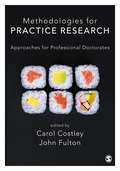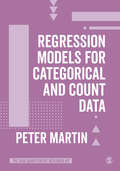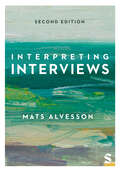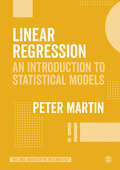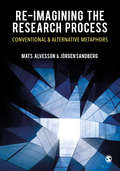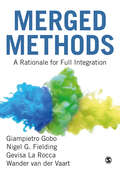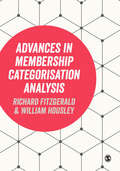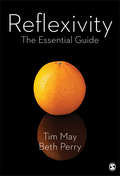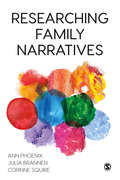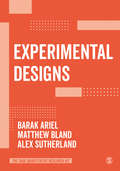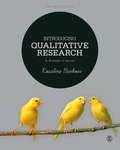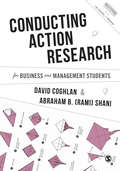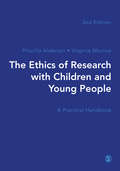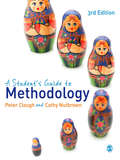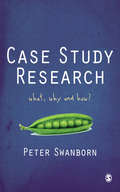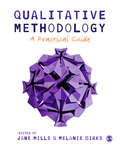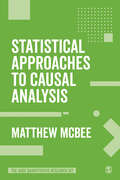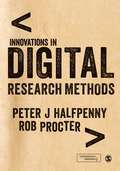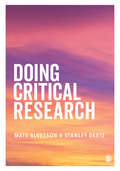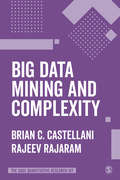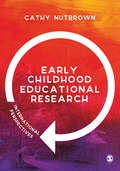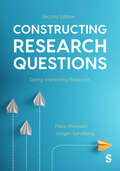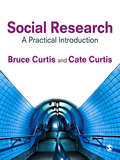- Table View
- List View
Methodologies for Practice Research: Approaches for Professional Doctorates
by John Fulton Carol CostleyOrder your digital inspection copy here. Sharp and focused, this book provides the need-to-know information on how to design and implement a good, high quality research project. Oriented around real-world application, it emphasizes the aspects of research most relevant to conducting practice-based research. Assuming no prior knowledge, but appropriate for experienced learners, it builds knowledge at a sustainable pace. It offers readers: - A no frills guide to methodology and the theory of conducting research - Strategies for communicating complex ideas - Insight into common impact-driven methods like action research, case study, and mixed methods - Ways to develop systematic research projects within the boundaries of everyday working life - Ample opportunities to test and apply newfound knowledge. With streamlined advice tailored specifically to support research in professional contexts, this book is the essential toolkit every researcher who is embarking on a practice-led project needs.
Regression Models for Categorical and Count Data (The SAGE Quantitative Research Kit)
by Peter MartinThis text provides practical guidance on conducting regression analysis on categorical and count data. Step by step and supported by lots of helpful graphs, it covers both the theoretical underpinnings of these methods as well as their application, giving you the skills needed to apply them to your own research. It offers guidance on: · Using logistic regression models for binary, ordinal, and multinomial outcomes · Applying count regression, including Poisson, negative binomial, and zero-inflated models · Choosing the most appropriate model to use for your research · The general principles of good statistical modelling in practice Part of The SAGE Quantitative Research Kit, this book will give you the know-how and confidence needed to succeed on your quantitative research journey
Interpreting Interviews
by Mats AlvessonThrough the use of eight original metaphors for understanding what may happen in interviews and what may guide the interviewee (more than telling the truth or revealing experiences), the reader is encouraged to do interviews in clever ways. This text enables you to question the interpretive nature and theoretical underpinnings of the interview method, and of the knowledge which is conveyed through it. The updated second edition includes new content on: • How to avoid traps in interviews • How to use interviewees with experience and insight • How to work creatively with generative material • The value of repeat interviewing over time • The importance of supplementing interviews with other methods • Possibilities of interview-based research accompanied by examples This text is essential reading for upper undergraduate and postgraduate students of qualitative methods, and researchers looking to more clearly conceptualize their interviewing practice and explore its theoretical basis. Mats Alvesson is professor at University of Bath and is also affiliated with Lund University, Stockholm School of Economics and Bayes Business School.
Linear Regression: An Introduction to Statistical Models (The SAGE Quantitative Research Kit)
by Peter MartinThis text introduces the fundamental linear regression models used in quantitative research. It covers both the theory and application of these statistical models, and illustrates them with illuminating graphs. The author offers guidence on: Deciding the most appropriate model to use for your research Conducting simple and multiple linear regression Checking model assumptions and the dangers of overfitting Part of The SAGE Quantitative Research Kit, this book will help you make the crucial steps towards mastering multivariate analysis of social science data.
Re-imagining the Research Process: Conventional and Alternative Metaphors
by Mats Alvesson Jorgen SandbergThis book offers a unique solution to the shortage of more imaginative and engaging research by re-imagining the core elements of the research process. In contrast to existing methods, which mainly focus on standard ingredients in the research process, the metaphorical approach taken here offers a more varied and comprehensive platform for producing novel, influential and relevant research. The set of guiding principles suggested in the book provides researchers with the resources to break away from existing conventions and templates for conducting and writing research. Re-imagining the Research Process: Conventional and Alternative Metaphors is suitable for upper-undergraduate and postgraduate students and researchers interested in challenging traditional views of the research process. Mats Alvesson holds a chair in the Business Administration department at Lund University in Sweden and is also a part-time professor at University of Queensland Business School, Australia and at Cass Business School, UK. Jorgen Sandberg is Professor at UQ Business School, University of Queensland, Australia, and Distinguished Research Environment Professor in Organization Studies at the Warwick Business School, UK.
Merged Methods: A Rationale for Full Integration
by Giampietro Gobo Nigel G. Fielding Gevisa La Rocca Wander van der VaartA new turn in mixed methods research is here: merged methods. This provocative book offers a novel analysis of current mixed methods research, complicating traditional approaches and challenging existing techniques. Moving beyond the binary quantitative-qualitative distinction, the book presents methodologically grounded ways to merge methods in social research and integrate interpretive and structural approaches in one instrument or procedure. The book: Considers the importance of merging both epistemologies and methodologies. Showcases eight merged methods research approaches, from the Delphi method to multimodal content analysis. Explores the opportunities for merging methods using computational techniques, such as text mining. This innovative book is a must-read for any postgraduate student or researcher across the social sciences wanting to develop their understanding of mixed methods research.
Advances in Membership Categorisation Analysis
by William Housley Richard FitzgeraldThis is an exciting addition to the dynamic, multidisciplinary field of membership categorization analysis. Bringing together the biggest names in MCA this landmark publication provides a contemporary analysis of the field and a platform for emerging researchers and students to build upon. The book sets out the current methodological developments of MCA highlighting its analytic strength – particularly when examining social identity and social knowledge. It provides a sophisticated tool of qualitative analysis and draws from a wide range of empirical studies provided by global scholars. The culmination of years of international research this agenda-setting text will be essential reading for academics and advanced students using membership categorization across the social sciences; particularly in media and communication studies, sociology, psychology, education, political science and linguistics.
Reflexivity: The Essential Guide
by Beth Perry Tim MayReflexivity – the critical examination of how we see the world – is integral to good research practice. From this state-of-the-art, accessible tour of its history and contemporary relevance, readers will learn of its importance to social research and to society generally. The text introduces a host of influential thinkers and their key ideas on reflexivity, and incorporates examples from a range of disciplines and research settings. Drawing on the authors’ extensive experience of real research settings, this book: Pinpoints the importance of reflexivity in social research Demonstrates its relevance to everyday life Firmly locates the concept in the history of ideas Explores key questions about the bases of knowledge and understanding Presents key thinkers, concepts and issues in easy-to-understand learning boxes The result is a book that provides students and researchers in the social sciences with the knowledge and understanding necessary not only to examine the role of reflexivity in contemporary life, but to apply it in their own research practice.
Researching Family Narratives
by Corinne Squire Julia Brannen Ann PhoenixThis edited book guides students and researchers through the processes of researching everyday stories about families. Showcasing the wide range methods and data sources currently used in narrative research, it features: Examples of real research into historical and contemporary family practices from around the world. Coverage of both traditional and cutting-edge topics, like multi-method approaches, online research, and paradata. Practical advice from leading figures in the field on how to incorporate these methods and data sources into family narrative research. With accessible language and features that help readers reflect on and internalize key concepts, this book helps readers navigate researching family lives with confidence and ease.
Linear Regression: An Introduction to Statistical Models (The SAGE Quantitative Research Kit)
by Peter MartinThis text introduces the fundamental linear regression models used in quantitative research. It covers both the theory and application of these statistical models, and illustrates them with illuminating graphs. The author offers guidence on: Deciding the most appropriate model to use for your research Conducting simple and multiple linear regression Checking model assumptions and the dangers of overfitting Part of The SAGE Quantitative Research Kit, this book will help you make the crucial steps towards mastering multivariate analysis of social science data.
Experimental Designs (The SAGE Quantitative Research Kit)
by Alex Sutherland Barak Ariel Matthew P. BlandThe fourth book in The SAGE Quantitative Research Kit, this resource covers the basics of designing and conducting basic experiments, outlining the various types of experimental designs available to researchers, while providing step-by-step guidance on how to conduct your own experiment. As well as an in-depth discussion of Random Controlled Trials (RCTs), this text highlights effective alternatives to this method and includes practical steps on how to successfully adopt them. Topics include: · The advantages of randomisation · How to avoid common design pitfalls that reduce the validity of experiments · How to maintain controlled settings and pilot tests · How to conduct quasi-experiments when RCTs are not an option Practical and succintly written, this book will give you the know-how and confidence needed to succeed on your quantitative research journey.
Introducing Qualitative Research: A Student′s Guide
by Rosaline S. BarbourRosaline Barbour draws on her extensive teaching experience to provide a clear, user-friendly introduction to the craft of doing qualitative research. Each chapter includes examples of real-life qualitative data and a range of exercises to help students get a feel for the process of generating and analysing qualitative data. The second edition includes: New examples from a range of social science disciplines, making this the perfect book no matter what course you’re studying More on unobtrusive methods of data collection, such as documentary analysis More on internet research methods, mixed methods and visual methods A new section on using software in qualitative research A brand new companion website full of additional lecturer and student resources.
Conducting Action Research for Business and Management Students (Mastering Business Research Methods)
by David Coghlan Abraham B. ShaniIn Conducting Action Research, Coghlan and Shani explain how action research differs from more detached research methods and provides expert guidance on how to engage effectively with it, helping the reader to complete both a successful research project and produce findings that are useful in an organizational context. Ideal for Business and Management students reading for a Master’s degree, each book in the series may also serve as reference books for doctoral students and faculty members interested in the method. Part of SAGE′s Mastering Business Research Methods, conceived and edited by Bill Lee, Mark N. K. Saunders and Vadake K. Narayanan and designed to support researchers by providing in-depth and practical guidance on using a chosen method of data collection or analysis.
The Ethics of Research with Children and Young People: A Practical Handbook
by Priscilla Alderson Virginia MorrowA practical guide to carrying out ethical research with children and young people, this practical handbook examines the ethical questions that arise at each stage of research, from first plans to dissemination and impact. Illustrated with case studies from international and inter-disciplinary research, it offers advice for addressing each ethical question, issue or uncertainty. Including: • A showcase of the best practice on a range of topics including data protection • Practical guidance for responding to recent global changes in policy and practice in ethics and law • Discussion of the challenges and opportunities of digital research with children The updated second edition continues to provide an excellent resource for those exploring the old, current and new consensuses on the ethics of researching with children.
A Student′s Guide to Methodology: Justifying Enquiry
by Cathy Nutbrown Peter CloughThe Third Edition of this hugely popular text provides students with straightforward principles and frameworks for understanding methodology. Peter Clough and Cathy Nutbrown are adept at making methodology meaningful for beginners and more advanced readers alike. Their book clearly demonstrates how methodology impacts upon every stage of the research process, and gives readers all of the tools that they need to understand it. New to this edition are the following: - new boxes and guidance on research ethics in every chapter - more international examples and perspectives - up to date coverage of online research methods - more examples from real students - a new companion website, featuring Powerpoint slides for lecturers The authors take an applied approach and every chapter contains a variety of practical examples from real research. Readers are encouraged to reflect on their own practice at every step, meaning that the book remains extremely relevant throughout. It will be invaluable for all students who are doing a dissertation or taking a research methods module in education, the social sciences, business and health.
Case Study Research: What, Why and How?
by Peter SwanbornHow should case studies be selected? Is case study methodology fundamentally different to that of other methods? What, in fact, is a case? Case Study Research: What, Why and How? is an authoritative and nuanced exploration of the many faces of case-based research methods. As well as the what, how and why, the author also examines the when and which - always with an eye on practical applications to the design, collection, analysis and presentation of the research. Case study methodology can prove a confusing and fragmented topic. In bringing diverse notions of case study research together in one volume and sensitising the reader to the many varying definitions and perceptions of ′case study′, this book equips researchers at all levels with the knowledge to make an informed choice of research strategy.
Qualitative Methodology: A Practical Guide
by Melanie Birks Jane MillsFresh, insightful and clear, this exciting textbook provides an engaging introduction to the application of qualitative methodology in the real world. Expert researchers then trace the history and philosophical underpinnings of different methodologies, explore the specific demands each places upon the researcher and robustly set out relevant issues surrounding quality and rigor. Featured methodologies include action research, discourse analysis, ethnography, grounded theory, case studies and narrative inquiry. This practical book provides a helpful guide to the research process - it introduces the relevant methods of generating, collecting and analysing data for each discrete methodology and then looks at best practice for presenting findings. This enables new researchers to compare qualitative methods and to confidently select the approach most appropriate for their own research projects. Key features include: Summary table for each chapter - allowing quick checks to test knowledge ′Window into′ sections - real world examples showing each methodology in action Student activities Learning objectives Full glossary Annotated suggestions for further reading Links to downloadable SAGE articles Links to relevant websites and organizations This is an invaluable resource for students and researchers across the social sciences and a must-have guide for those embarking on a research project.
Statistical Approaches to Causal Analysis (The SAGE Quantitative Research Kit)
by Matthew McBeeThis book provides an up-to-date and accessible introduction to causal inference in quantitative research. Featuring worked example datasets throughout, it clearly outlines the steps involved in carrying out various types of statistical causal analysis. In turn, helping you apply these methods to your own research. It contains guidance on: Selecting the most appropriate conditioning method for your data. Applying the Rubin’s Causal Model to your analysis, a mathematical framework for understanding and ensuring accurate causation inferences. Utilising various techniques and designs, such as propensity scores, instrumental variables analysis, and regression discontinuity designs, to better synthesise and analyse different types of data. Part of The SAGE Quantitative Research Kit, this book will give you the know-how and confidence needed to succeed on your quantitative research journey.
Innovations in Digital Research Methods
by Rob Procter Peter HalfpennyVast amounts of digital data are now generated daily by people as they go about their lives, yet social researchers are struggling to exploit it. At the same time, the challenges faced by society in the 21st century are growing ever more complex, and demands research that is bigger in scale, more collaborative and multi-disciplinary than ever before. This cutting-edge volume provides an accessible introduction to innovative digital social research tools and methods that harness this ‘data deluge’ and successfully tackle key research challenges. Contributions from leading international researchers cover topics such as: Qualitative, quantitative and mixed methods research Data management Social media and social network analysis Modeling and simulation Survey methods Visualizing social data Ethics and e-research The future of social research in the digital age This vibrant introduction to innovative digital research methods is essential reading for anyone conducting social research today.
Doing Critical Research (Sage Series In Management Research Ser.)
by Mats Alvesson Stanley DeetzThis title builds on the success of Doing Critical Management Research which has proven to be a seminal text in the 20 years since publication. In 2020, Alvesson and Deetz have broadened their focus and updated the original book to offer relevance to critical research across all of the social sciences. In reflecting contemporary theoretical and methodological turns over the past few decades, it includes coverage of key contemporary topics such as race, gender, postmodernism and intersectionality. With examples throughout, the authors provide an authoritative and insightful framework for navigating critical theories and methods and sets out a new agenda for critical research undertaken today.
Regression Models for Categorical and Count Data (The SAGE Quantitative Research Kit)
by Peter MartinThis text provides practical guidance on conducting regression analysis on categorical and count data. Step by step and supported by lots of helpful graphs, it covers both the theoretical underpinnings of these methods as well as their application, giving you the skills needed to apply them to your own research. It offers guidance on: · Using logistic regression models for binary, ordinal, and multinomial outcomes · Applying count regression, including Poisson, negative binomial, and zero-inflated models · Choosing the most appropriate model to use for your research · The general principles of good statistical modelling in practice Part of The SAGE Quantitative Research Kit, this book will give you the know-how and confidence needed to succeed on your quantitative research journey
Big Data Mining and Complexity (The SAGE Quantitative Research Kit)
by Rajeev Rajaram Brian C. CastellaniThis book offers a much needed critical introduction to data mining and ‘big data’. Supported by multiple case studies and examples, the authors provide: Digestible overviews of key terms and concepts relevant to using social media data in quantitative research. A critical review of data mining and ‘big data’ from a complexity science perspective, including its future potential and limitations A practical exploration of the challenges of putting together and managing a ‘big data’ database An evaluation of the core mathematical and conceptual frameworks, grounded in a case-based computational modeling perspective, which form the foundations of all data mining techniques Part of The SAGE Quantitative Research Kit, this book will give you the know-how and confidence needed to succeed on your quantitative research journey.
Early Childhood Educational Research: International Perspectives
by Cathy NutbrownEarly Childhood educational research is a constantly evolving field. This book brings together Cathy Nutbrown’s considerable knowledge and expertise in the field, to deliver a comprehensive and critical overview of national and international research. The strengths of various types of research, and their influence on theory, policy and practice, are identified along with new and emerging research areas, and anticipated future topics and patterns of research. Through an analytical discussion of research topics addressing Children, Adults and Pedagogy, these key areas are highlighted: - Issues in research design - Types of and trends in methodological approaches - The ethics of research With digestible chapter introductions, thinking points and suggestions for research or dissertation topics, readers are also able to locate their own work in an international landscape. This is the perfect ‘go to’ resource for all early childhood education and social science researchers. Cathy Nutbrown will be discussing ideas from Early Childhood Educational Research in Doing Your Early Years Research Project, a SAGE Masterclass for early years students and practitioners in collaboration with Kathy Brodie.
Constructing Research Questions: Doing Interesting Research
by Mats Alvesson Jorgen SandbergA key step for researchers wanting to produce interesting and influential theory development is formulating innovative research questions. In this text, Alvesson and Sandberg have developed a problematization methodology for identifying and challenging the assumptions underlying existing knowledge, and for generating research questions that can lead to more impactful theories. The second edition of this popular text has been fully updated, with more illustrative examples and insights from a diverse range of recent studies which explore methods for conducting more innovative research. This book is essential reading for students and researchers looking to formulate interesting research questions and conduct more engaging and original research. Mats Alvesson is Professor of Business Administration at the University of Bath, and also affiliated with Lund University, Stockholm School of Economics and Bayes Business School, City, University of London. Jörgen Sandberg is Professor in the University of Queensland (UQ) Business School and Honorary Professor at Warwick Business School.
Social Research: A Practical Introduction (Sage Benchmarks In Social Research Methods Ser.)
by Bruce Curtis Cate CurtisOriginal, fresh and relevant this is a theoretically-informed practical guide to researching social relations. The text provides a mixed methods approach that challenges historical divisions between quantitative and qualitative research. It adopts a multidisciplinary approach to social science research, drawing from areas such as sociology, social psychology and social anthropology. Explicitly addressing the concerns of emergent researchers it provides both a ′how to′ account of social research and an understanding of the main factors that contextualize research by discussing ′why do′ social scientists work this way. Throughout the twelve comprehensive chapters procedural (how to) accounts and contextual (why do) issues are usefully applied to major themes and substantive questions. These key themes include: (1) Research design (2) The practices of research and emergent researchers: Beyond ontology, epistemology and methodology (3) The impact of technology on research (4) Putting the research approach in context. A superb teaching text this book will be relished by lecturers seeking an authoritative introduction to social research and by students who want an accessible, enriching text to guide and inspire them.
